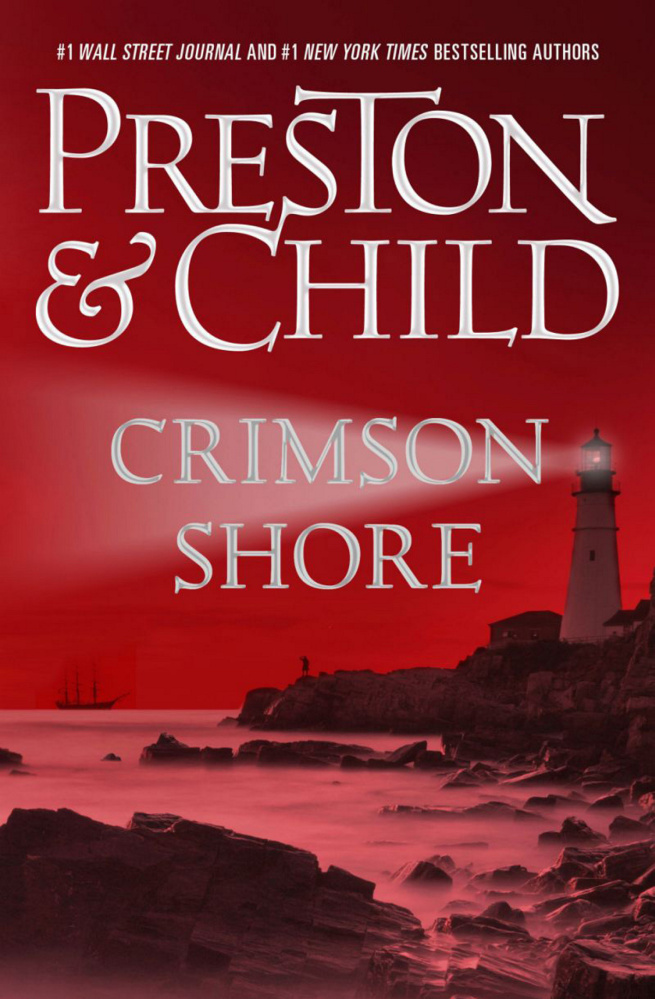Over the course of 15 novels, Douglas Preston and Lincoln Child have created one of the most distinctive – and eccentric – sleuths in the history of crime fiction. FBI Special Agent Aloysius X. L. Pendergast, first encountered in “Relic” back in 1995, solves crimes as no one else does. The co-authors have developed a back story and family history for him as bizarre and complicated as anything in the genre.
Now the tall, pale, brilliant and socially awkward sleuth returns in “Crimson Shore,” in which he and Constance Greene, his beautiful, mysterious “ward,” investigate murder and mayhem in a small town in coastal Massachusetts. Although the authors have already concocted two trilogies in the series, this new installment proves to be fairly self-contained, the story designed to welcome long-time fans and new readers alike.
In “Crimson Shore,” sculptor Percival Lake wants Pendergast’s help in locating an irreplaceable wine collection, stolen from the cellar of his lighthouse home in Exmouth, Massachusetts. Pendergast specializes in serial killer cases, and he doesn’t usually conduct private investigations, but he is tempted into action once Lake agrees to pay him with a nearly priceless bottle of Chateau Haut-Braquilanges, somehow overlooked by the thieves.
Arriving at the small town in a ’54 Porsche Spyder Roadster, Pendergast and Greene make an indelible impression on the residents, especially upon the chief of police, who has taken a lackadaisical approach to the break-in at the Lake home and resents input from out-of-towners. Once Pendergast inspects the scene of the crime, the stakes are raised even higher by the discovery of a secret niche behind a brick wall. Pendergast spots “the distal phalanx of the left index finger of a human being,” which is enough to tell him that some poor unfortunate was once bricked up alive in the hidden compartment. The missing skeleton might have been the actual motive for the break-in.
From there, the investigation leads to two murders, in which the skin of both victims is carved with strange symbols. Could the sinister markings be connected to the Witch Trials in nearby Salem? Local legend has it that “real” witches fled Salem in 1692 and escaped to the salt marshes surrounding Exmouth. Some say that these devotees of the black arts continue to practice their religion to this very day.
Employing very different sets of skills, Pendergast and Greene interview various Exmouth locales, charming some and offending many. Gradually, they begin to see a pattern of evil that stretches back centuries and threatens still more bloodshed in the present day.
In any Pendergast novel, there is never any expectation of gritty realism or strict adherence to police procedure, as in, say, one of Michael Connelly’s Harry Bosch novels. Preston and Child work to get the forensic details right, but the series’ pulp roots are hard to miss. Although blond, blue-eyed and from New Orleans, Pendergast behaves like some combination of Sherlock Holmes and The Shadow, with a touch of Batman thrown in for good measure. Past installments have included everything from secret Tibetan mind tricks to elixirs that slow the aging process nearly indefinitely. Supporting characters are routinely thought to be dead, only to re-appear in subsequent installments, little worse for wear and more dangerous than ever.
Regrettably, the plot of “Crimson Shore,” reveals itself as more far-fetched than usual. Without giving too much away, let’s say that readers are expected to accept one outrageous set of circumstances for roughly half the novel, only to be asked to swallow an even bigger lump of unlikelihood in the concluding portion. The “little town with a big secret” is a venerable trope in adventure fiction, and Preston and Child do a fine job of giving the familiar set-up their own unique New England spin. Their inclination to up the narrative ante as far as possible, however, eventually sets the whole structure wobbling disconcertingly.
“Crimson Shore” adds twists and surprises right up until its final sentence. That’s how Preston and Child keep their readers coming back for more. If this latest installment of their Pendergast series doesn’t rank among their best, it at least delivers the expected amount of thrills and provides additional insight into a pair of idiosyncratic and highly entertaining sleuths.
Berkeley writer Michael Berry is a Portsmouth, New Hampshire, native who has contributed to Salon, the San Francisco Chronicle, New Hampshire Magazine, the Los Angeles Review of Books and many other publications. He can be contacted at:
mikeberry@mindspring.com
Twitter: mlberry
Send questions/comments to the editors.



Success. Please wait for the page to reload. If the page does not reload within 5 seconds, please refresh the page.
Enter your email and password to access comments.
Hi, to comment on stories you must . This profile is in addition to your subscription and website login.
Already have a commenting profile? .
Invalid username/password.
Please check your email to confirm and complete your registration.
Only subscribers are eligible to post comments. Please subscribe or login first for digital access. Here’s why.
Use the form below to reset your password. When you've submitted your account email, we will send an email with a reset code.